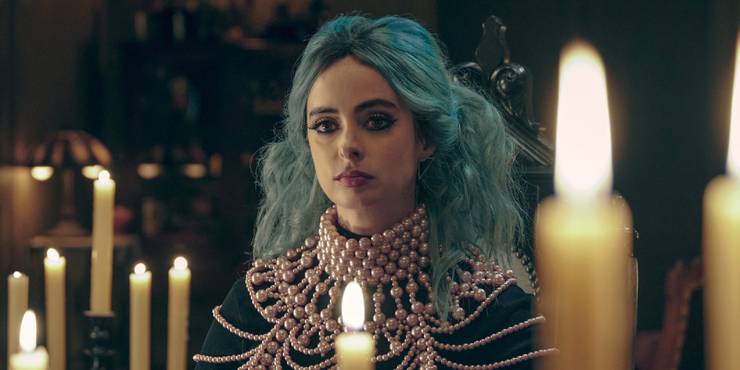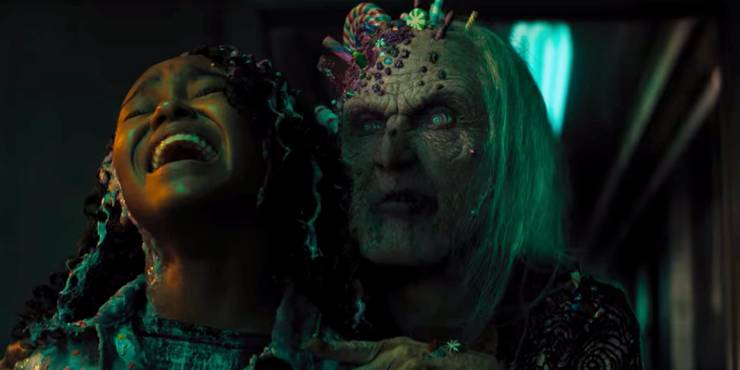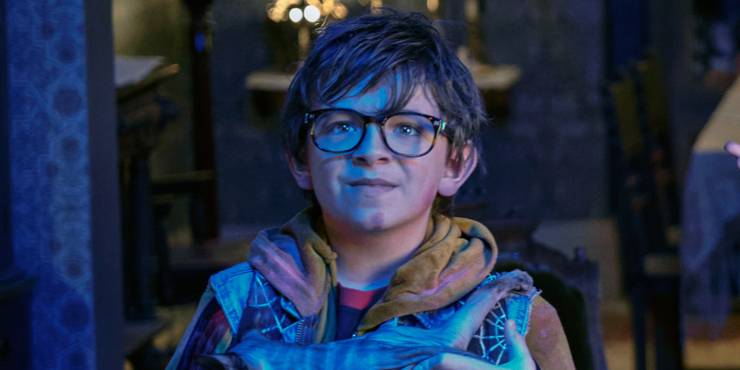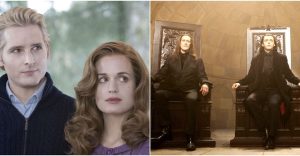Nightbooks Ending Explained

The Netflix family horror movie Nightbooks‘ ending involves a major plot twist and an encounter with an ancient, bloodthirsty witch. Along the way, the movie reinvents the legend of Hansel and Gretel. The ending also helps to fully explore Nightbooks‘ themes about the power and potential pitfalls of creativity, making it much more interesting than many typical fantasy thrillers.
Nightbooks tells the story of Alex, a horror-obsessed kid who is constantly writing stories in the notebooks he calls “Nightbooks.” Fleeing from social rejection, he enters the magical apartment of the witch Natacha. Once there, he finds himself tasked with an unusual duty: writing and reading a new scary story to Natacha each night, under threat of death. Alex finds himself unable to write new stories, but he learns more about the apartment and Natacha’s curse with the help of his new friend Yasmin, and mysterious purple writing in the books of Natacha’s library. Nightbooks pushes kid-friendly horror’s boundaries with its creepy monsters and real peril, but ultimately has a warm ending with a compelling message.
With his books full of backup stories destroyed by a spider-like “shredder”, Alex puts his escape plan into action. The notes found in Natacha’s book have provided a recipe for a sleeping potion, which he and Yasmin plan to use to knock out Natacha and steal her keys to the outside world. They trick Natacha into telling them the remaining ingredient using a story, knowing her penchant for correcting details. Finally, with the help of the witch’s familiar Lenore, they are able to sneak the potion into Natacha’s “blue mist” perfume bottle and knock her unconscious. However, despite this success, the kids are unprepared for what lies outside the apartment. Here’s what the Nightbooks ending really means.
Natacha’s World Explained

Once they leave the apartment through the back door, Alex and Yasmin find themselves in strange woods created by Nightbooks‘ witch Natacha, played by Krysten Ritter. They encounter a black “evil unicorn” and a trail of crumbs leading to a gingerbread house, which Alex recognizes as being similar to the myth of Hansel and Gretel. Despite being aware of the dangers, the children are compelled to eat the sweets and fall asleep. It’s only when they wake us, and are once again in the clutches of Natacha, that she finally explains how the world around them actually operates.
Natacha’s apartment and the woods around it are a kind of pocket dimension, where the rules of the regular world don’t apply. The dimension is able to open doors to locations around the world, but evidently only one at a time. After Alex has been imprisoned for several days, the front door still leads out into his apartment building, suggesting that there may be limitations on the apartment’s movement. The apartment can also alter its dimensions like Doctor Who‘s TARDIS, accommodating a towering library.
The forest was created by Natacha, and it appears to be shaped by her past and subconscious desires. She reveals that the purple-inked writing of “unicorn girl” that Alex finds in the library books was actually hers. This writing mentions that Natacha was lured in by the image of a unicorn and that she compared her plight to the fairy tale of Hansel and Gretel, both of which appear in the woods. Her backstory, and the true nature of the magical apartment, reflect the way in which Nightbooks revises and subverts the classic fairy tale.
The Significance of Hansel & Gretel

Natacha insists that every story should have truth in it, and in her case, the story of Hansel and Gretel turned out to be painfully real. Nightbooks joins series like Once Upon A Time and Tell Me A Story in adapting fairy tales with a modern setting and dark twist. Whether or not the old witch Grizelda was the villain from the famous story, she had a similar modus operandi, luring children in with their favorite food or other treats and ultimately eating them.
The role of fairy tales and scary stories becomes clear as Natacha explains why she has been having Alex and other children read scary stories every night. Stories of fear and despair calm Grizelda enough to keep her asleep. When she is left too long without a story, or there is a hint of a happy ending, the earth rumbles, suggesting that the entire pocket dimension rests on Grizelda’s psyche.
The revelation that Natacha is working to please a more powerful witch makes her cruelty more rational, although still not exactly justifiable. Natacha is still a villain and could appear in a potential Nightbooks sequel, but the main threat in the final act of Nightbooks is the ravenous Grizelda, who chases Alex into his apartment building. But just like the witch in Hansel and Gretel, she ends up burned to death, this time in the building’s furnace chasing Alex’s book of stories. Both this ending and Hansel and Gretel’s larger importance to the plot of Nightbooks show how creativity is vital to the movie’s message and ending.
The True Meaning of the Nightbooks Ending

The Nightbooks ending exemplifies the movie’s wider message about the power of creativity, as well as how easily it can be misused. Alex eventually reveals that he was rejected by his classmates, even his best friend Josh, who thought he was weird for his obsession with horror and scary stories. This led to Alex wanting to destroy his “nightbooks” and tearing down the spooky decorations in his room such as the posters for his favorite movie Lost Boys. His classmates’ attitudes represent the rejection of creativity and difference which artists and authors must fight against.
Natacha’s apartment may initially seem to be Alex’s perfect scenario, providing him with a space where his scary stories are valued. However, Natacha only wants stories a certain way: adhering to a pre-existing universe that he doesn’t know about, always with a formulaic unhappy ending, and produced on a harsh daily schedule. This situation could be analogous to producing commercial art, which offers an opportunity to exercise creativity but always under someone else’s rules and for their interests. Ultimately, by giving his own story a happy ending, Alex is able to both embrace his own strangeness and break out of the rules imposed by Natacha. This leads to the climactic chase, with a monster that wouldn’t be out of place in a Paranormal Activity or other adult horror movie. He understands that doing so entails a risk (in this case the literal risk of awakening Grizelda), but that it is the only chance he ever has of escaping.
The ending, where Alex and Yasmin return to the real world as friends, shows that Alex has returned to writing in his Nightbooks. Yasmin brings him a new notebook, showing the importance of finding a support network that values one’s creativity. The Nightbooks ending thus shows that the film’s message is about the importance of creativity, not being afraid of rejection, and being one’s true self.
About The Author

















